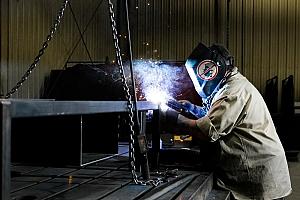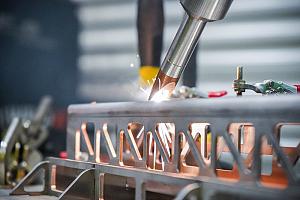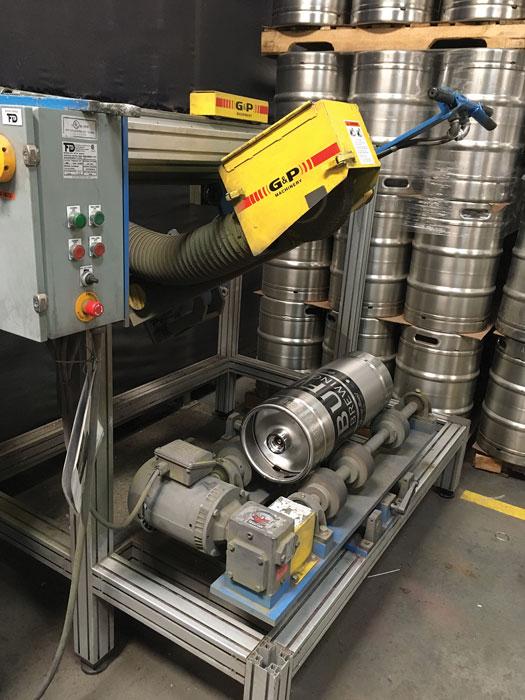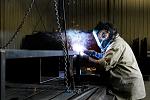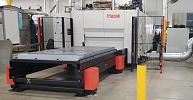- FMA
- The Fabricator
- FABTECH
- Canadian Metalworking
Categories
- Additive Manufacturing
- Aluminum Welding
- Arc Welding
- Assembly and Joining
- Automation and Robotics
- Bending and Forming
- Consumables
- Cutting and Weld Prep
- Electric Vehicles
- En Español
- Finishing
- Hydroforming
- Laser Cutting
- Laser Welding
- Machining
- Manufacturing Software
- Materials Handling
- Metals/Materials
- Oxyfuel Cutting
- Plasma Cutting
- Power Tools
- Punching and Other Holemaking
- Roll Forming
- Safety
- Sawing
- Shearing
- Shop Management
- Testing and Measuring
- Tube and Pipe Fabrication
- Tube and Pipe Production
- Waterjet Cutting
Industry Directory
Webcasts
Podcasts
FAB 40
Advertise
Subscribe
Account Login
Search
Polisher adds versatility and capacity to beer keg refinishing
- May 4, 2018
- Product Release
- Finishing
Situation
At the BLEFA GmbH factory in Kreutzal, Germany, beer kegs are produced from 304 stainless steel and polished to a No. 4 finish. Those kegs then travel to the BLEFA Kegs Inc. plant in La Vergne, Tenn., where they receive silk-screened logos. Ultimately, the keg-leasing companies that own the kegs then lease them to the craft breweries. When the customers or brands change or the silk-screen printing logos wear, the kegs must be polished to remove the old labels before new ones can be applied.
The La Vergne facility handled large-volume repolishing orders with an automatic three-head polishing machine equipped with a Donaldson-Torit central dust collection system and loaded/unloaded by a FANUC robot. However, the setup process was too involved to be practical for small batches or for kegs needing special handling. The company needed to find equipment that would reduce setup for shorter runs, add flexibility, and increase production capacity.
Resolution
BLEFA Kegs Inc. consulted with Grinding & Polishing Machinery Corp. (G&P), a manufacturer of industrial grinding and polishing machinery, which designed a machine that polishes small keg lots efficiently. The system uses two sets of rollers to support and rotate the keg while it is polished with a rotating flap wheel or brush. Keg sizes typically vary from a half-barrel, with a diameter of about 15.5 inches, to a sixth-barrel, with a diameter of slightly more than 9 in.
The operator first loads a keg manually onto the rollers. If necessary, one bank of rollers can be adjusted to change the span and accommodate kegs of different diameters while keeping the polishing wheel centered above the keg. Once the machine is turned on, the operator can start the rollers and adjust their speed as needed. By grasping the machine’s handlebars, he then can move the rotating flap wheel or brush across the surface of the rotating keg until the desired finish is achieved. The handlebars are equipped with safety switches that stop the wheel from rotating if the operator’s hands are not in position.
Depending on the condition of the kegs, BLEFA uses either a coarse, softer, 12-in.-diameter Matchless flap wheel or a hard 3M Scotch-Brite HS Blend & Finish Premium flap brush wheel. President Chris Zweifel says the softer wheels can get into dented areas more easily, while the hard wheels remove ink faster on newer kegs. Zweifel noted that the machine’s design lets the operator see clearly where there is still silk screen residue to be removed. In all cases, the surface of a keg must be clean, without any dirt, grime, or residue after polishing, so new silk screen prints can be applied.
According to Zweifel, the machine produces polished finishes comparable to those obtained with the automated three-head machine. The ergonomic positioning and side-to-side motion that control the polishing brush simplify the operator’s job, and all moving parts are safely covered.
BLEFA now has two such machines: one at its Tennessee plant and another in Washington. Zweifel said the keg polishers are designed to be mobile. They can be shipped via LTL carrier and can be set up quickly at any desired location. “We can move the machine and a small dust collector to a customer’s location to do mobile rebranding,” he explained.
G&P Machinery Corp.
www.gandpmachineryin.com
subscribe now

The Fabricator is North America's leading magazine for the metal forming and fabricating industry. The magazine delivers the news, technical articles, and case histories that enable fabricators to do their jobs more efficiently. The Fabricator has served the industry since 1970.
start your free subscription- Stay connected from anywhere

Easily access valuable industry resources now with full access to the digital edition of The Fabricator.

Easily access valuable industry resources now with full access to the digital edition of The Welder.

Easily access valuable industry resources now with full access to the digital edition of The Tube and Pipe Journal.
- Podcasting
- Podcast:
- The Fabricator Podcast
- Published:
- 04/30/2024
- Running Time:
- 53:00
Seth Feldman of Iowa-based Wertzbaugher Services joins The Fabricator Podcast to offer his take as a Gen Zer...
- Industry Events
Pipe and Tube Conference
- May 21 - 22, 2024
- Omaha, NE
World-Class Roll Forming Workshop
- June 5 - 6, 2024
- Louisville, KY
Advanced Laser Application Workshop
- June 25 - 27, 2024
- Novi, MI
Precision Press Brake Certificate Course
- July 31 - August 1, 2024
- Elgin,

